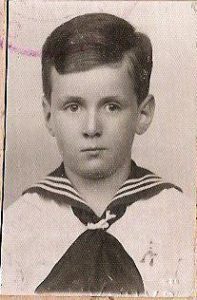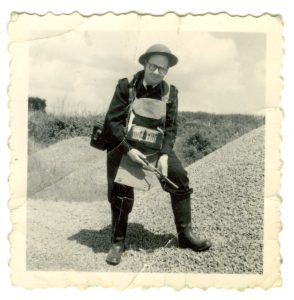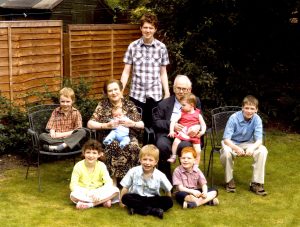As the end of an engineering project comes into sight it is time to carry out a review of the undertaking and to think about the contents of the project report. The stakeholders require such a review so as to learn from the past and to use the lessons for shaping the future. It is with this in mind that I respond to the request to give to the Institute an account of my life and work. The Institute has given me many of the opportunities that made my work possible, it had entrusted me with its leadership as a President and had honoured me for my service. It is therefore entitled to ask me for an account.
An autobiographical report needs to be read critically. However much we strive for honesty and truth, we describe ourselves as we wish to be seen and not necessarily as others see us. We also write with the benefit of hindsight and present an orderly and rational view of the past, while real life is less neat and tidy. The task of evaluation and judgement is left to the reader.
I was born on the 6 December 1929 in the town of Lwów in Poland, the only child of a wealthy and educated Jewish couple. I was intended from birth to enter the family business. I led a happy and privileged early childhood. The outbreak of the Second World War in September 1939 determined my subsequent life.
My town was seized by the Soviet Union, which attacked Poland in collaboration with Germany. The Soviet authorities began to remove socially dangerous elements from the newly acquired lands. My father was arrested in April 1940 and vanished into a labour camp. My mother and I were deported to a remote settlement on the borders of Siberia. We suffered from cold hunger and disease. My mother and I survived, but others died. The experience largely influenced me to become an engineer. I became convinced as a young boy that the basic needs of humanity for food, water and shelter were of paramount importance and that it is through technical means that it must be provided. The attack by Germany on the Soviet Union in 1941 changed Poles from enemies to allies of the Soviet Union. We were released from deportation and my father from his imprisonment. He was an officer of the reserve of the Polish Army and joined the Polish Army Corps then being formed in the Soviet Union. We had the good fortune to find each other and my mother and I joined my father. In 1942 the Polish Army Corps was transferred from the Soviet Union to the Middle East where it came under British command. My mother and I followed my father during his service in the Middle East. My schooling was disrupted and sporadic. I gained much of my education from my mother. In particular she taught me English.
At the end of the war we found ourselves with no home to return to. My native town had been incorporated into the Soviet Union, Poland had a Communist government and there was no safe return for Polish soldiers who served with the British. Fortunately we were given asylum in Britain and treated with generosity.
I came to Britain with knowledge of English and a London Matriculation Certificate gained overseas by self-study. I had gained knowledge of the history and culture of the country by reading books. I was grateful for the opportunity to make England my home and determined to justify the confidence the country placed in me.
My foremost wish was to acquire a professional education. My schooling preparation was poor, but financial provisions had been made for the education of Poles granted asylum in this country. The Northern Polytechnic, then an institution of the University of London, admitted me as a student. I studied Physics; a discipline that I was advised was the basis of modern technology. I graduated in 1951 with a BSc General in Physics, Pure Mathematics and Applied Mathematics and a BSc Special in Physics.
I obtained employment as a Technical Assistant in Electronic Tubes Ltd. working on problems in the manufacture of electronic tubes. I worked on the production floor and learned much about engineering practice and about people.
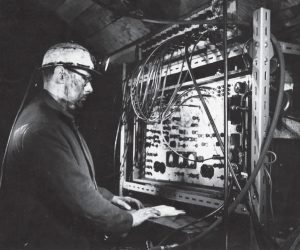 However, my first appointment did not offer me challenging technical work. After one year I joined the Mining Research Establishment of the National Coal Board. Coal mining was then one of the core industrial activities and the development of the technology of mining was a major national task. Talented scientists and engineers, who had learned about electronics as part of the war effort, came into mining to apply the new technology to its problems. I was fortunate to be learning from them. I worked first on instrumentation for non-destructive testing and then on the automation of mining machinery. Much of the latter work was underground. I found the work challenging, exciting and exhilarating. I rose to become the leader of a small team.
However, my first appointment did not offer me challenging technical work. After one year I joined the Mining Research Establishment of the National Coal Board. Coal mining was then one of the core industrial activities and the development of the technology of mining was a major national task. Talented scientists and engineers, who had learned about electronics as part of the war effort, came into mining to apply the new technology to its problems. I was fortunate to be learning from them. I worked first on instrumentation for non-destructive testing and then on the automation of mining machinery. Much of the latter work was underground. I found the work challenging, exciting and exhilarating. I rose to become the leader of a small team.
From the time I graduated I realised that the knowledge I had was inadequate and I set about remedying the deficiency. I took evening and day release courses in electrical engineering and then a part-time course for an MSc of the University of London in Physics, the main part of which was research on the modelling of transducers. I graduated in 1959.
My work on the design and application of instrumentation for mining fascinated me. It was then an art rather than a science. My academic studies of transducers indicated to me that a science of instrumentation was possible. In 1959 an opportunity arose for me to take part in the development of such a discipline. The Northampton College of Advanced Technology, with a tradition of teaching instrument technology going back to the beginning of the twentieth century, initiated a programme in instrumentation and control at university level. I enquired about it and was offered and accepted a post as Lecturer in Instrument and Control Engineering.
I was inspired by the vision of the Colleges of Advanced Technology to bridge the gap between science and practice. I found teaching a rewarding task and enjoyed the contact with students. I applied myself to the development of measurement and instrumentation as an academic discipline. I advanced to become Principal Lecturer.
Expansion and reform of higher education as a result of the Report of the Robbins Committee caused the transformation of Northampton CAT into City University. I was fearful that we would lose our vision of integration science and practice. It has been a struggle not to lose sight of the ideal, when prevailing culture was against it.
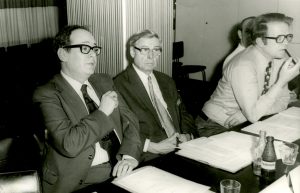 However, as a university, we gained new opportunities to engage in research. I was appointed Reader in 1967 and charged with the task of developing research in my field. In 1970 I was appointed Professor of Measurement and Instrumentation.
However, as a university, we gained new opportunities to engage in research. I was appointed Reader in 1967 and charged with the task of developing research in my field. In 1970 I was appointed Professor of Measurement and Instrumentation.
My research objectives were to develop measurement and instrumentation as a systematic discipline, to study the ways it could be taught, to develop relevant aspects of its theory and to apply theory to significant practical problems. The approach was to treat measurement as an information process and instruments as information machines, to apply to their analysis and design the rapidly advancing science of systems and control, to develop a design-orientated approach to instruments and instrumentation based on systems engineering. We built up a team to undertake the tasks. A notable area of work was the mathematical modelling of instruments and the use of the models in analysis and design. Another was the modelling and identification of biological organisms with application to medicine. Industrially there was a cooperative arrangement with SIRA, which was then the spearhead of the application of science to industrial instrumentation and automation.
The research programme was the work of many people, fellow members of staff and students. It is impossible to give credit to them all. I must firstly give thanks to Monty Williams who initiated the programme and recruited me. I am grateful to Philip McPherson for inspirational leadership and friendship. In the research my gratitude goes in particular to Ewart Carson who developed the area measurement and information in medicine and became a leading international authority. My other duty is to thank the late Faruq Abdullah, who developed the mathematical modelling of instruments. Ron Fischbacher was there at the start of the work on behalf of SIRA and Terry Flanagan was an outstanding support and adviser throughout. My work owes much to them.
I also was greatly helped by two sabbatical periods in centres of international excellence. One at the beginning of the work at the Delft University of Technology and one towards the end at Imperial College, where I had the great pleasure to work with my eldest son.
The work resulted in some two hundred publications of which I was author, or co-author, including four books. There were also some direct industrial applications. The principal outputs were the students, graduate, postgraduate and research.
My work was recognised by the award of a DSc of City University in measurement and instrumentation science and technology. I was also elected to the Fellowship of Engineering, now the Royal Academy of Engineering.
This account concentrates on my work on measurement and instrumentation, but this was only one aspect of my activities. Much of my work was devoted to engineering education in general and to management. I occupied a number of significant posts including a period as Head of the Department of Systems Science and later as Head of the Department of Physics. I became the foundation Dean of the School of Engineering and later a Pro-Vice-Chancellor. These were the posts from which I retired in 1993.
Throughout my work the Institute of Measurement and Control was the professional body that made my work possible. I served for two terms as a Vice-President and was President in 1980-1. I also had served it as Honorary Secretary and Honorary Treasurer. The Institute rewarded me by election as Honorary Fellow.
I also derive much satisfaction of being a Liveryman of the Worshipful Company of Scientific Instrument Makers. They have greatly honoured me by electing me as Senior Steward.
I believe that science and technology are a worldwide activity. The Institute has given me the opportunity to work internationally through IMEKO, the International Measurement Confederation. I had been a member of its General Council, Chairman of its Technical Committee on Higher Education, Editor of its journal, Measurement, and served for a term as its Vice-President. Much of the publication of my work has been through IMEKO.
I was also active in what was then the IEE serving for a term as Chairman of its Management and Design Division.
My colleagues have been very generous in recognising my work. I was awarded the Hartley Medal. The City University London has conferred on me an honorary doctorate and so had the prestigious State Technical University of St Petersburg, Russia. The work on mathematical modelling of instruments was the recipient of the Worshipful Company of Scientific Instrument Makers Achievement Award.
Outside my university work an important role activity of my life was my service in civil defence. I joined the Civil Defence Corps in 1952, responding to a call for scientists to join as volunteers, out of a sense that I owed a special duty to the country that gave me a home. I served until its disbandment in 1967. I then held the rank of a senior staff officer. I continued my work in the Home Office scientific service for home defence until this was stood down in 1994. I was then Chief Regional Adviser for Greater London. My service was recognised by the award of the Queen’s Silver Jubilee Medal in 1977 and appointment as OBE in 1990.
I was fortunate to be able to continue, as a Professor Emeritus, the work in measurement and instrumentation at City University after my retirement. I am principally engaged in work on the theory and philosophy of measurement, but continue some other research as well, publishing my work.
It is a great satisfaction to see my university expanding and improving. While it has diversified its subject range and is no longer a technical institution it has returned to a sharp focus of being a university for business and the professions. The fact that the two leaders of the School in which I work are now Prof K T V Grattan FREng and Prof S H Khan, good and supportive friends, whose early career I helped to launch, is to me a source of great pleasure.
I have gained, since my retirement, the opportunity to engage more seriously in some of my other interests. One of the principal ones are Jewish Studies. I studied at Leo Baeck College London, the principal rabbinical seminary for Progressive Judaism in Europe. I graduated with an MA in Hebrew and Jewish Studies and then a PhD in the field. The studies have given me much intellectual satisfaction and insight.
I married, in 1957, Mirjam Wiener, the daughter of a well-known historian of Nazism and an early campaigner against it. Mirjam is a graduate scientist who has worked in industry and as a teacher. Her effective support has made my work possible. Mirjam, who was brought up in Holland experienced war as an inmate of Belsen. Notwithstanding the experiences of our youth we live a very normal life. Judaism provides a very satisfying framework for our family. We feel very integrated in English life and devoted to this country and its values. We have two sons and a daughter, all married. We have eight grandchildren. Our children all have jobs of responsibility and influence. I look to them to make some of the contributions to the life of this country that I aimed for in my youth and failed to make.
I am still professionally active and this is in the nature of a progress report rather then a final account. However I recognise that the great bulk of my contribution is behind me, rather than before me. I have much confidence in those that have followed me and are shaping the future. I hope that in some small measure my teaching and research will help them.
